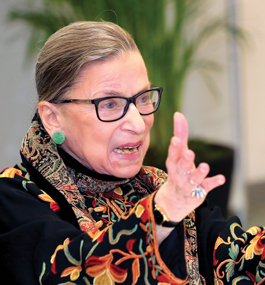Pending Questions: Students Talk With Ruth Bader Ginsburg

Mike Lovett
Ruth Bader Ginsburg
Before delivering a major address to open the university’s semester-long centennial celebration of Louis D. Brandeis’ Supreme Court confirmation, Supreme Court Justice Ruth Bader Ginsburg met with a group of students for a vibrant exchange that was equal parts career counseling, judicial wisdom and high-court history.
Ginsburg gave the keynote lecture at a panel discussion held at Gosman Sports and Convocation Center on Jan. 28 — 100 years to the day that President Woodrow Wilson nominated Brandeis to the high court.
Prior to addressing the crowd, Ginsburg set aside an hour to meet with 30 students, many of whom had taken legal-studies lecturer Dan Breen’s course “Louis Brandeis: Law, Politics and Business.”
 |
|
Sidebar Story |
 |
Ginsburg fielded students’ questions on such issues as sexism, privacy, judicial activism and the future for women in law. The queries were thoughtful and factual; the justice’s answers were candid and persuasive.
For instance, Allie Goodman ’16, asked, “If an opinion is of pressing importance, such as Brown v. Board of Education or Marbury v. Madison, do you feel yourself under particular obligation while writing a majority opinion or dissent to make it comprehensible to a majority of Americans?”
“Have any of you read Marbury v. Madison? Do you think it’s comprehensible to any Americans?” Ginsburg responded, prompting laughter.
“I try at least to write so that other judges, and lawyers, will understand what the ruling is,” she continued. “I do work very hard on my opinions to make them as comprehensible as I can, recognizing that some of the technical issues that come before us will not be understood by a lay audience.”
Aspiring lawyer Jennifer Almodovar ’18, a Sorensen Fellow, sought counsel on how to confront sexism: “What advice would you give to girls everywhere who would like to take the world by storm?”
Women who feel patronized because of their gender shouldn’t react in anger, Ginsburg advised. Her mother-in-law, she said, once gave her a pair of wax earplugs along with some words of wisdom: “Sometimes, it helps to be a little deaf.”
“I took that advice and applied it not only to my marriage but to my workplace, even today,” Ginsburg explained.
Ginsburg was emphatic about the bright future for women in law. “I would be very optimistic about the prospects for young women entering the legal profession,” she said. “When I entered law school, women were about 2 percent of the lawyers in the country. My entering law-school class had over 500 students; nine of them were women. […] There are no closed doors anymore. There’s no branch or practice that’s off-limits to women. Yes, we haven’t reached nirvana, but we’re heading in the right direction.”
Josh Lugar ’16 asked the justice about her relationships with occupants of the White House, including Jimmy Carter, who in 1980 appointed her to the U.S. Court of Appeals for the District of Columbia Circuit.
Because Carter believed the judiciary should look like “the great United States,” Ginsburg said, he wanted “to appoint members of minority groups and women — not as one-at-a-time curiosities, but in numbers — to the federal bench.”
As a result, Carter “appointed over 25 women to federal trial courts, 11 to courts of appeals, and I was one of the lucky 11,” said Ginsburg. “He hoped part of his legacy would be that he’d change the complexion of the U.S. judiciary.”
Student Union president Nyah Macklin ’16 asked what Ginsburg would tell future progressive leaders confronting “systems that are perpetuating complacency.”
“I’d say, [in] any movement for social change, first thing is to have people join you, be with you,” Ginsburg counseled. “Persuade other people of your view. […]And then the first resort is the legislature; try to get the law changed. And if the legislature won’t budge, then [take it to] the courts.”
Doctoral candidate Stephen Alkins, president of the Graduate Student Association, asked about privacy in the age of surveillance, a concern expressed eloquently by Louis Brandeis as early as 1890.
“There is no express right of privacy in the U.S. Constitution,” Ginsburg replied. “So it has to be extracted from other guarantees, say, freedom of expression, the right to be secure in our homes and offices against Big Brother government coming in and seizing our papers. […] I suppose we’ll always have many cases involving the right to privacy. And when that comes up against the demands of government, it’s a hard balance.”
Rebecca Mitchell ’16 brought up the political hot-button issue of judicial activism: “Do you think that Supreme Court justices have a responsibility to be activists and advocates for social justice?”
“What is an activist judge?” asked Ginsburg. “If you judge it by willingness to strike down laws passed by the political branches, then I would have to say I’m probably the most restrained judge currently on the Supreme Court, because this ‘conservative’ court has struck down as unconstitutional — in my view — too many laws. So I would say if the activism means that the judge is trumping the political branches — being aggressive in that way — well, frankly, […] what it comes down to is whose ox is being gored.
“If you don’t like what the court is doing, you will call it activist. And if you do like it, you’ll say this is a court behaving the way a court should.”
— Jarret Bencks
